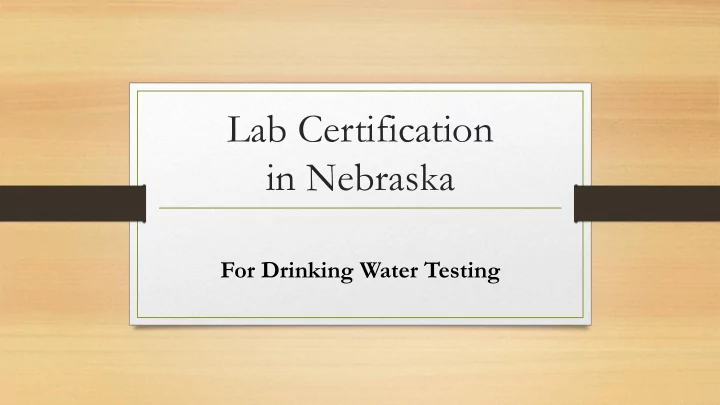

Lab Certification in Nebraska For Drinking Water Testing
Info can be found at dhhs.ne.gov/lab
Lab Certification Requirements - Must use methods specified in EPA Drinking Water Regulations - Employ both a Lab Director and Quality Assurance Officer meeting the minimum qualifications - Maintain current administrative and analytical SOPs that follow EPA format - Maintain a current Laboratory Quality Assurance Plan with components specified in the EPA Manual for the Certification of Laboratories Analyzing Drinking Water - Analyze a proficiency test (PT) sample within the last 60 days with acceptable results for each method the lab is seeking certification for. PT must be purchased from an approved PT provider and the PT provider must send results directly to NPHEL Lab Certification Manager. - Submit completed application and required documentation as indicated on the checklist.
Helpful Manuals for the Certification Process
Micro Checklist from the EPA Certification Manual is 40 pages long and covers the following areas 1. Personnel 2. Laboratory Facilities 3. Laboratory Equipment and Supplies 4. General Laboratory Practices 5. Analytical Methodology 6. Sample Collection, Handling, and Preservation 7. Quality Assurance 8. Records and Data Reporting 9. Action Response to Laboratory Results
This Is Only A Sampling Of Quality Controls Required • • Clean, climate-controlled room Reagent water tested monthly for pH, cond., HPC, residual chlorine • All records must be kept min of 5yrs • Reagent water tested annually for heavy metals, Fl-, • Maintenance log on all equipment maintained NO3 • Each lot of substrate tested for fluorescence & pH • Thermometers check against NIST annually • Each lot of bottles checked for sterility & fluorescence • Balance calibrated before use / weights certified every • 5yrs & calibrated every 6 months Each lot of Quanti-trays tested for sterility • • Incubator at 35 ± 0.5ºC Monthly check on QT sealer • • Temperatures taken 2x/day, minimum of 4 hours apart Dilution water autoclaved & checked for sterility • At least 1 external proficiency test/yr. NPHEL runs external positive & negative controls with every batch.
Q. So why is all this quality control needed???? A. To prevent false positives and false negatives False positives can incur costs for clients such as shocking a well or well remediation False negatives can have health impacts, sometimes severe
Labs currently certified by the State of Nebraska
Recommend
More recommend